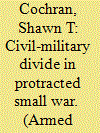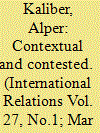| Srl | Item |
| 1 |
ID:
127811


|
|
|
|
|
| Publication |
2014.
|
| Summary/Abstract |
This article examines the basis of military leadership preferences toward war termination, and thus the basis of the associated civil-military divide, within the context of protracted small war. The conventional wisdom posits military leadership preferences as a near-constant in favor of persistence and thus expects a dominant pattern of military obstructionism. However, such a pattern does not hold empirically across the population of small wars. This gap between expectation and evidence derives at least in part from the limits of the bureaucratic-organizational model, focused on the military's desire for resources, autonomy, and influence, that underlies the conventional wisdom. In contrast, this article suggests an alternative model privileging the demands of institutional legitimacy. The legitimacy motive as conceptualized here is particularly salient to the small war context. It accordingly provides a foundation for better understanding variation in military leadership preferences toward war termination and thus variation in the direction and intensity of the civil-military divide.
|
|
|
|
|
|
|
|
|
|
|
|
|
|
|
|
| 2 |
ID:
121853


|
|
|
|
|
| Publication |
2013.
|
| Summary/Abstract |
This article introduces a novel conceptual/analytical framework to Europeanization studies. Its main aims are twofold: first, it problematizes the mainstream usage of the term Europeanization, and the notion of change that it has embraced, and second, it develops a fuller account of the impact of European integration on societies. An analytical distinction is drawn between EU-ization as a formal process of alignment with the EU's body of law and institutions, and Europeanization as a wider sociopolitical and normative context. The impact of Europeanization in a given society is heavily conditioned by the extent and the ways in which Europe is used as a context by domestic actors. To substantiate its arguments, the article focuses on the Turkish case, where Europeanization as a normative-political context has extensively been implicated in its modernization and nation-building processes as well as in recent domestic debates concerning the country's identity and future orientation.
|
|
|
|
|
|
|
|
|
|
|
|
|
|
|
|